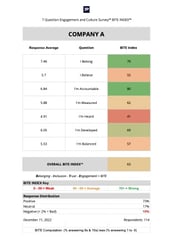If you own a business and have been hiring employees with regularity, you are probably well aware of the incursion of the Millennial generation upon the workforce. Millennials are rapidly coming to make up the lion’s share of the American workforce, and generational differences between Millennials and the owners of the companies that employ them are said to be both obvious and plentiful.
How different are Millennials from the Baby Boomers or Generation Xers that preceded them? In our estimation, not very much. However, the absence of true differences between Millennials and their older coworkers has not prevented the promulgation of a pervasive “Millennial Myth” that has rendered many workplaces toxic. Most of the prevailing ideas about Millennials are simply absurd, but there is nothing absurd about the deleterious influence those ideas are having on many organizations.
Is our company suffering from the Millennial Myth? If it is, the fault may lie with you, but that does not mean it cannot be corrected. The 7 Question 7 Promise Framework for creating a Patient Organization was born out of the need to deconstruction false beliefs about Millennials. With that in mind, here are five clear signs that you and your business are suffering from a false belief in the Millennial Myth.
1. You don’t care about Millennial complaints.
Sign: Honestly you really would rather not have to deal with Millennial complaints.
One of the common themes about Millennials is that they are frequent whiners that are constantly questioning why things are done a certain way. Yet, if you think back to your youth, you might realize that you and your peers were the same way. In fact, your complaints were more than likely born out of a belief that there was a better way to do things that the old timers simply were not aware of. This led you to become frequently frustrated by their perceived disinterest in your very legitimate concerns about business being handled incorrectly in the modern world.
Now, in your case, the shoe may or may not be on the other foot. However, before you dismiss the complaints of the Millennials on your staff as the dismissible whining of veritable children, ask yourself if any of the criticisms have merit. Chances are, at least some of those criticisms are rooted in the belief that things could be done in a more practical way. Better yet, there is an equal likelihood that those complaints are the sign that your workers wish to become fully engaged in the business, and want to be heard, specifically, by you. Having employees that care about the practices of the companies they work for is always an asset.
2. You don’t think you need to keep Millennials happy.
Sign: Keeping Millennials happy looks like too much work, why bother.
Several sets of statistics have been cited to give rise to the belief that Millennials are capricious and prone to leave the companies that employ them at the drop of a hat. If this is true, then there really is no sense in applying the effort required to keep them happy, is there? After all, they have no real attachment your business - certainly not to the degree that you do - so what is the sense in prioritizing their happiness if they are simply going to leave?
Sadly, business owners that adopt this attitude have things completely backwards. In order to keep any employees from leaving your business, whether they are Millennials or not, the workers must feel that their well being is of importance to the company and the people who run it. People who feel as if the organization they work for is an impersonal entity that could trudge along without skipping a beat if they were to resign are actually more likely to leave. If you want the loyalty of employees, it is critical for you to demonstrate some concern for their happiness. Displays of genuine care on your part will absolutely force your employees to consider whether or not they will receive the same consideration at another business.
3. You don’t invest in development opportunities for Millennials.
Sign: You find your leaders rolling their eyes and yourself saying, “Really isn’t you job description enough? Why do you worry about your development?"
Almost everyone dreams of one day becoming their own boss or starting their own company, and the desires of Millennials are said to be more fantastical than those of prior generations in this respect. With this in mind, several business owners are reluctant to devote resources to training the young people on their payrolls, critically consumed by the belief that investing time and money in the development of an employee who leaves a business is a waste of resources. On the one hand, this belief is understandable, but on the other hand, this amounts to cutting off one’s nose to spite their own face.
The refusal to invest in development opportunities for high-potential employees harms a company in two key ways. First, it artificially restricts the performance levels those employees can achieve if they remain with your company, meaning your business will never benefit from employing the best versions of those employees. Second, if these top performers feel as if their maximum potential will never be achieved if they stay with your company, that is all the more reason for them to depart from your business and either strike out on their own, or find another organization that will help them maximize their skills. Either way, failing to develop high-potential employees because you fear the eventual loss of those employees is a self-fulfilling prophecy. Ultimately, your inaction will drive them out the door and into the welcoming arms of another opportunity.
4. You don’t discuss business goals with Millennials.
Sign: You find yourself asking, "Why do they need to know about business goals?"
Due to the nearly universal belief that Millennials simply don’t care about the goals of the companies they work for, many business owners assume there is no reason to discuss big-picture objectives with them. Like several of the other points on this list, these actions create a chicken-or-the-egg scenario in which Millennial employees view themselves as meaningless cogs in a machine that couldn’t care any less about them, and business owner view Millennials as employees who couldn’t care any less about the businesses they work for.
In all sincerity, no employee - Millennial or otherwise - can be made to care about the mission of a company unless they are first entrusted with the mission and understand their role in accomplishing that mission. There is a big difference between the attitudes of two soldiers that are performing the same tasks, but one of them thinks he is simply peeling potatoes, and the other believes he is helping his country to win a war. Getting employees to believe in the mission of the company requires them to understand their significance in the grand scheme of things. Providing Millennials with the meaning behind their duties can empower them to become some of your most valuable and influential employees.
5. You don’t have clear performance measurements for Millennials.
Millennials have been raised in an era where “transparency” has grown from being a corporate catchphrase to an internal requirement for many companies. Because of this, Millennials often demand transparency in all aspects of life, including from the organizations that employee them. Often, employers are loath to provide Millennials with clear metrics by which to measure their performances, out of the belief that it is none of the employees’ business how the company is doing, or because the employer wants to reserve the right to dismiss employees due to factors that may have nothing to do with anything definable by data.
Realistically, a business owner that wants to reserve the right to let go of employees due to personality conflicts certainly needs to refine the hiring practices of the organization to make sure their issues are dealt with on the front end. Second, having employees that strive for clear transparency is a good thing, because these employees are the easiest to get collective agreement from when it comes to determining which metrics are the best measures of their effectiveness. Believe it or not, most employees actually embrace when they are measured fairly.





